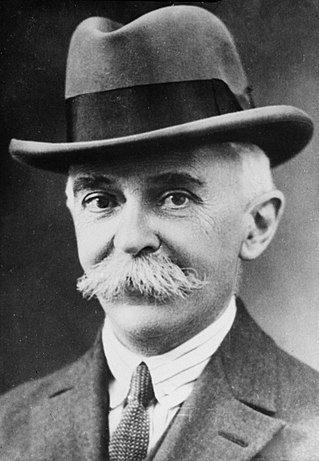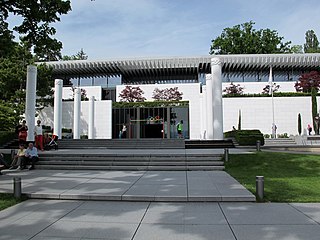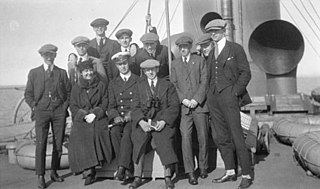
Charles Pierre de Frédy, Baron de Coubertin, also known as Pierre de Coubertin and Baron de Coubertin, was a French educator and historian, co-founder of the International Olympic Committee, and its second president. He is known as the father of the modern Olympic Games. He was particularly active in promoting the introduction of sport in French schools.

The 1924 Summer Olympics, officially the Games of the VIII Olympiad and also known as Paris 1924, were an international multi-sport event held in Paris, France. The opening ceremony was held on 5 July, but some competitions had already started on 4 May. The Games were the second to be hosted by Paris, making it the first city to host the Olympics twice.

The 1908 Summer Olympics were an international multi-sport event held in London, England, United Kingdom, from 27 April to 31 October 1908. The 1908 Games were originally scheduled to be held in Rome, but were relocated on financial grounds following the violent eruption of Mount Vesuvius in 1906, which claimed over 100 lives; Rome eventually hosted the Games in 1960.

At the 1900 Summer Olympics, three croquet events were contested. Seven men and three women participated. The doubles competition was scheduled first, though it is unclear whether the French pair that won had any competition. The one-ball singles was played the next week, followed by two-ball singles the week after. France, which supplied all 10 competitors, therefore won all the medals.

The International Olympic Committee (IOC) uses icons, flags, and symbols to elevate the Olympic Games. These symbols include those commonly used during Olympic competition—such as the flame, fanfare and theme—as well as those used throughout the years, such as the Olympic flag.

The Olympic Museum in Lausanne, Switzerland houses permanent and temporary exhibits relating to sport and the Olympic movement. With more than 10,000 artifacts, the museum is the largest archive of Olympic Games memorabilia in the world and one of Lausanne's prime tourist site draws attracting more than 250,000 visitors each year.

Ice hockey was introduced to the Olympic Games at the 1920 Summer Olympics in Antwerp. The tournament also served as the first World Championships. The matches were played between April 23 and April 29, 1920. Canada, represented by the Winnipeg Falcons, won the gold medal. The silver went to the United States and Czechoslovakia took the bronze.
David Wallechinsky is an American popular historian and television commentator, the president of the International Society of Olympic Historians (ISOH) and the founder and editor-in-chief of AllGov.com and worldfilmreviews.us.
Baseball had its first appearance at the 1912 Summer Olympics as a demonstration sport. A game was played between the United States, the nation where the game was developed, and Sweden, the host nation. The game was held on Monday, 15 July 1912 and started at 10 a.m. on the Ostermalm Athletic Grounds in Stockholm; the U.S team won after six innings.
Baseball was again a demonstration sport at the 1936 Summer Olympics after a 24-year absence. Both of the teams that played in Berlin were from the United States.
Stamata Revithi was a Greek woman who ran the 40-kilometre marathon during the 1896 Summer Olympics. The Games excluded women from competition, but Revithi insisted that she be allowed to run. Revithi ran one day after the men had completed the official race, and although she finished the marathon in approximately 5 hours and 30 minutes and found witnesses to sign their names and verify the running time, she was not allowed to enter the Panathinaiko Stadium at the end of the race. She intended to present her documentation to the Hellenic Olympic Committee in the hopes that they would recognize her achievement, but it is not known whether she did so. No known record survives of Revithi's life after her run.

The first heat of the men's 100 metres race was the first event run at the modern Olympics, on 6 April 1896. The event consisted of 3 heats and a final, held on 10 April. The 100 metres was the shortest race on the Athletics at the 1896 Summer Olympics programme. 15 athletes from 8 nations competed. The event was won by Thomas Burke of the United States. Fritz Hofmann of Germany took second, with Hungarian Alajos Szokolyi and American Francis Lane tying for third. These competitors are recognized as gold, silver, and bronze medalists by the International Olympic Committee, though that award system had not yet been implemented in 1896.
Paul Van Asbroeck was a Belgian sport shooter who competed in the early 20th century in rifle and pistol shooting. He competed at the 1900 Olympics in Paris and won a bronze medal in the military rifle 3 positions category. However the medal was tied with Norwegian Ole Ostmo.
José Álvarez de las Asturias Bohórquez y Goyeneche, 10th Marquess of Trujillos was a Spanish horse rider. Álvarez de Bohórquez competed in the 1924 Summer Olympics and won the team jumping gold medal in the 1928 Summer Olympics. His name is also shortened to José Álvarez de Bohórquez, José Á. de Bohórquez, or José Álvarez.
Ove Karlsson was a sports journalist and Olympic historian from Sweden. He was working as a journalist for more than 50 years. Since the 1970s, he was also involved in the Swedish Olympic Committee's team guides and official reports. In 1991, he was a founding member of the ISOH. In 1994, he was also a founding president of the Olympic Section of the SIHSS.
Sharon Weber is an American gymnastics official best known for taking the Judge's Oath at the 1984 Summer Olympics in Los Angeles. She was the first woman to take the judge's oath at the Olympic Games.
William James Mallon is an American orthopedic surgeon, former professional golfer and a leading authority on the history of the Olympic Games.

The 1920 Summer Olympics ice hockey rosters consisted of 60 players on 7 national ice hockey teams. Played at the Olympic Games for the first time, and later regarded by the International Ice Hockey Federation (IIHF) as the first World Championship. Teams were required to be strictly amateur, so players from the Canadian-based National Hockey League (NHL) or other professional leagues were excluded. Canada sent the Winnipeg Falcons, who had won the 1920 Allan Cup, the amateur championship in Canada.
Idrottsbladet was a sports magazine which existed between 1910 and 2009 in Stockholm, Sweden. During its lifetime it was the largest sports magazine in Scandinavia.







